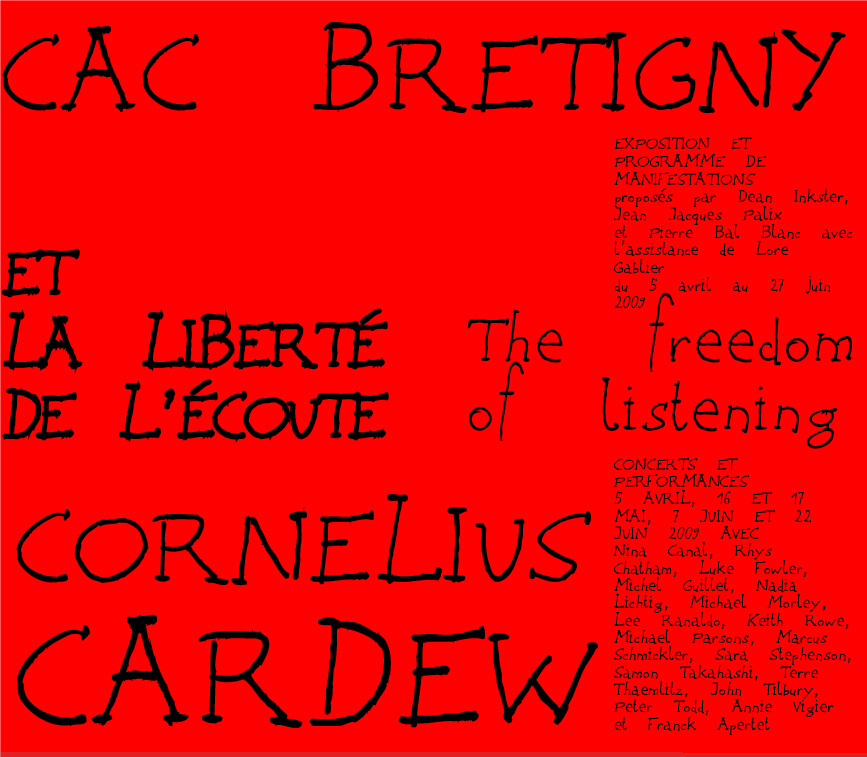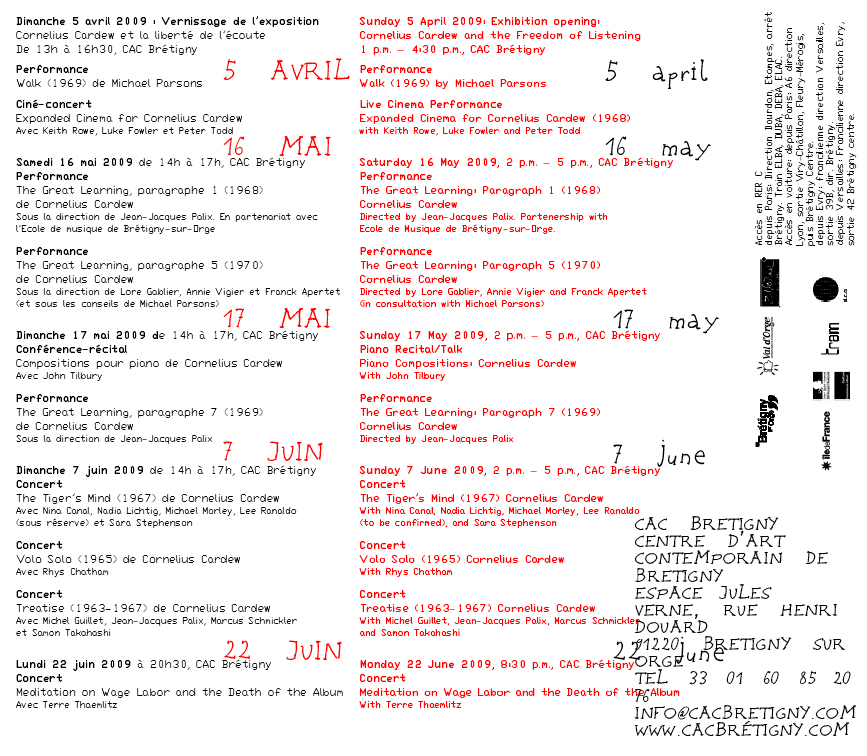
Photo: Steeve Beckouet
"Cornelius Cardew and the freedom of listening"
On the invitation of Pierre Bal-Blanc, this exhibition, curated by Dean Inkster, Jean Jacques Palix & Lore Gablier
was shown at CAC de Brétigny sur Orge,
as well at Künstlerhauss Stuttgart & Culturgest Porto in 2009 and 2010.
The English composer Cornelius Cardew (1936-1981) is undoubtedly one of the major composers to have emerged in the second half of the twentieth century. Although he has not yet received widespread public recognition, as have the two composers, Karlheinz Stockhausen and John Cage, who initially influenced his direction as a composer, Cardew inspired a generation of British avant-garde composers and musicians. Such internationally recognized composers as Gavin Bryars, Brian Eno, Michael Nyman, and Frederic Rzewski have all claimed Cardew as an important influence on their own musical development. Moreover, Cardew’s radical approach to composition and his political reflection on the status of music making led him, in the late sixties, to instigate one of the most important attempts to establish the democratic claims of avant-garde culture. The Scratch Orchestra, which grew out of classes Cardew taught at Morley College (an adult education college in South London) in 1968, radically questioned the social limitations of art and music making as realms of specialized knowledge and experience.
Combining both musicians and non-musicians, the Scratch Orchestra not only transgressed the traditional boundaries and hierarchy separating the composer, performer, and listener, but also the boundaries dividing the realm of art into separate fields; visual and performance art were equally a part of the collective and creative experience that inspired the members of the Scratch Orchestra throughout its four-year existence.
Since 2006, the seventieth anniversary of his birth, a renewed interest in Cardew's work as a composer and political figure has developed. An anthology of Cardew's writings, Cornelius Cardew (1936-1981): A Reader (Copula, 2006), and an exhibition, Lonely at the Top: Sound Effects #3, at the MukHA in Antwerp (June-August 2008), were followed by the publication of a major biography, Cornelius Cardew (1936-1981): A Life Unfinished (Copula, 2008), written by pianist (and ex-Scratch Orchestra member) John Tilbury. In light of this interest, and given that Cardew's work is little known outside a specialized audience in France, the CAC Brétigny will present an exhibition (including scores, documentary photographs, films, and other visual material) that traces Cardew's career from the seminal graphic score Treatise (1965-67) to the history of the Scratch Orchestra and its dissolution in 1975, when Cardew renounced his work as an avant-garde composer and, until his death in 1981, devoted his energy to politics. In conjunction with the exhibition, the CAC will present a series of performances of works spanning Cardew's career, along with a number of compositions by former members of the Scratch Orchestra. In a historical moment when it is all to easy to sentimentalize “over the good old days of experiment and action,” as one recent review of Cardew's writings has suggested, the exhibition will not only attempt to retrace the history of one of the most influential post-war twentieth century composers and the important, yet still little known, avant-garde group he inspired, but also show why Cardew's example is needed “to shake us out of our current complacency and despair.”
Dean Inkster
Cardew archives at CAC Bretigny (spring 2009)
"Treatise" live at CAC Bretigny
"Volo Solo" live at CAC Bretigny
Cardew's exhibition guide published by CAC de Bretigny (french & english)
Cardew's exhibition : press and review
17/05/2009 events' pictures at CAC Bretigny a
Stuttgart's Cardew exhibition (autumn 2009)
"Cornelius Cardew e a liberdade da escuta" in Porto / Culturgest (spring 2010)
Cornelius Cardew's biography
"Cornelius Cardew et la liberté de l'écoute"
Le compositeur anglais Cornelius Cardew (1936-1981) est sans aucun doute l'un des compositeurs les plus importants de la seconde moitié du vingtième siècle. Bien qu'il reste aujourd'hui encore largement ignoré du public, contrairement à Karlheinz Stockhausen et John Cage dont il reconnaît l'influence sur son propre parcours, Cornelius Cardew a inspiré toute une génération de compositeurs et de musiciens britanniques reconnus à travers le monde. Des artistes tels que Gavin Bryars, Brian Eno, Michael Nyman et Frederic Rzewski ont tous revendiqué l'ascendance de Cornelius Cardew dans leur propre développement musical. Son approche radicale de la composition et sa réflexion politique des processus d'élaborations de la musique le conduisent en outre à initier, à la fin des années soixante, l'une des tentatives les plus abouties de répondre aux revendications démocratiques des avant-gardes. Le Scratch Orchestra, qu'il forme en 1968 à l'intérieur d'un cours qu'il dispense au Morley College – une école londonienne pour adulte – met radicalement en cause les limites sociales de l'art et de la musique en tant que domaines spécialisés de savoir et d'expérience. À travers le Scratch Orchestra, qui mêle à la fois des musiciens expérimentés et des non musiciens, il ne s'agit pas seulement de dépasser les limites traditionnelles et la hiérarchie qui distingue compositeur, interprète et auditeurs, mais aussi de remettre en cause le cloisonnement de l'art en domaines séparés. L'art visuel et la performance feront donc partie intégrante de l'expérience collective et créative du Scratch Orchestra tout au long des quatre années de son existence.
Depuis le soixante-dixième anniversaire de sa naissance en 2006, on assiste à un renouvellement de l'intérêt porté à l'oeuvre de Cornelius Cardew en tant que compositeur et figure politique. Le pianiste John Tilbury, ex-membre du Scratch Orchestra, lui consacre une importante biographie, parue en anglais en octobre 2008 et qui suit de peu la récente publication d'une anthologie de ses écrits ainsi que l'exposition « Lonely at the top » que lui a consacré cet été le MukHA à Anvers, en Belgique. Compte tenu de ce regain d'intérêt et du manque de reconnaissance en France de l'oeuvre de Cornelius Cardew en dehors d'un public spécialisé, le Centre d'Art Contemporain de Brétigny propose une exposition qui retrace sa carrière : depuis l'élaboration de sa composition graphique Treatise jusqu'à l'histoire du Scratch Orchestra et de sa dissolution en 1975, moment où il finit par renoncer à tout lien avec l’avant-garde et conforme ses oeuvres à son engagement politique comme membre du Parti Communiste Révolutionnaire de Grande-Bretagne. Conjointement à cette exposition, le CAC Brétigny présentera une série de performances et de concerts retraçant les différents moments de l'oeuvre de Cornelius Cardew, ainsi que des compositions d'anciens membres du Scratch Orchestra. Dans un contexte historique où il est commode de s'en remettre à la sentimentalité des « bons vieux jours de l'expérimentation et de l'action», ainsi que le laisse entendre un article récent sur les écrits de Cornelius Cardew, l'exposition tentera non seulement de retracer l'histoire d'un mouvement d'avant-garde encore largement méconnu mais de montrer en quoi l'oeuvre de Cornelius Cardew est à même de nous « secouer pour nous sortir du désespoir et de la complaisance ».
Dean Inkster

